Australian Smart College - BSBFIM601 Manage Finances Assignment
VerifiedAdded on 2022/08/12
|9
|1962
|15
Homework Assignment
AI Summary
This document is a comprehensive finance assignment that addresses various aspects of financial management. It begins by defining financial probity and its importance, followed by examples of fraudulent behaviors in company finances, such as misappropriation and skimming. The assignment then explores the auditing process, the differences between cash and accrual accounting, and the advantages and disadvantages of each method. It also covers essential taxation and superannuation requirements for businesses, including GST, superannuation contributions, ABN, and PAYG schemes. The assignment further delves into the Corporation Act 2001 and ASIC standards for financial reporting, including tax rates for small and large companies, and the reporting of GST through the Business Activity Statement (BAS). It also addresses the implications of suppliers not providing an ABN and the GST registration requirements for non-profit organizations. Finally, the assignment includes a debtor management report, analyzing Grow Management Consultants' policies and providing recommendations for better debtor management, such as credit term periods, record keeping, and collection agency services.
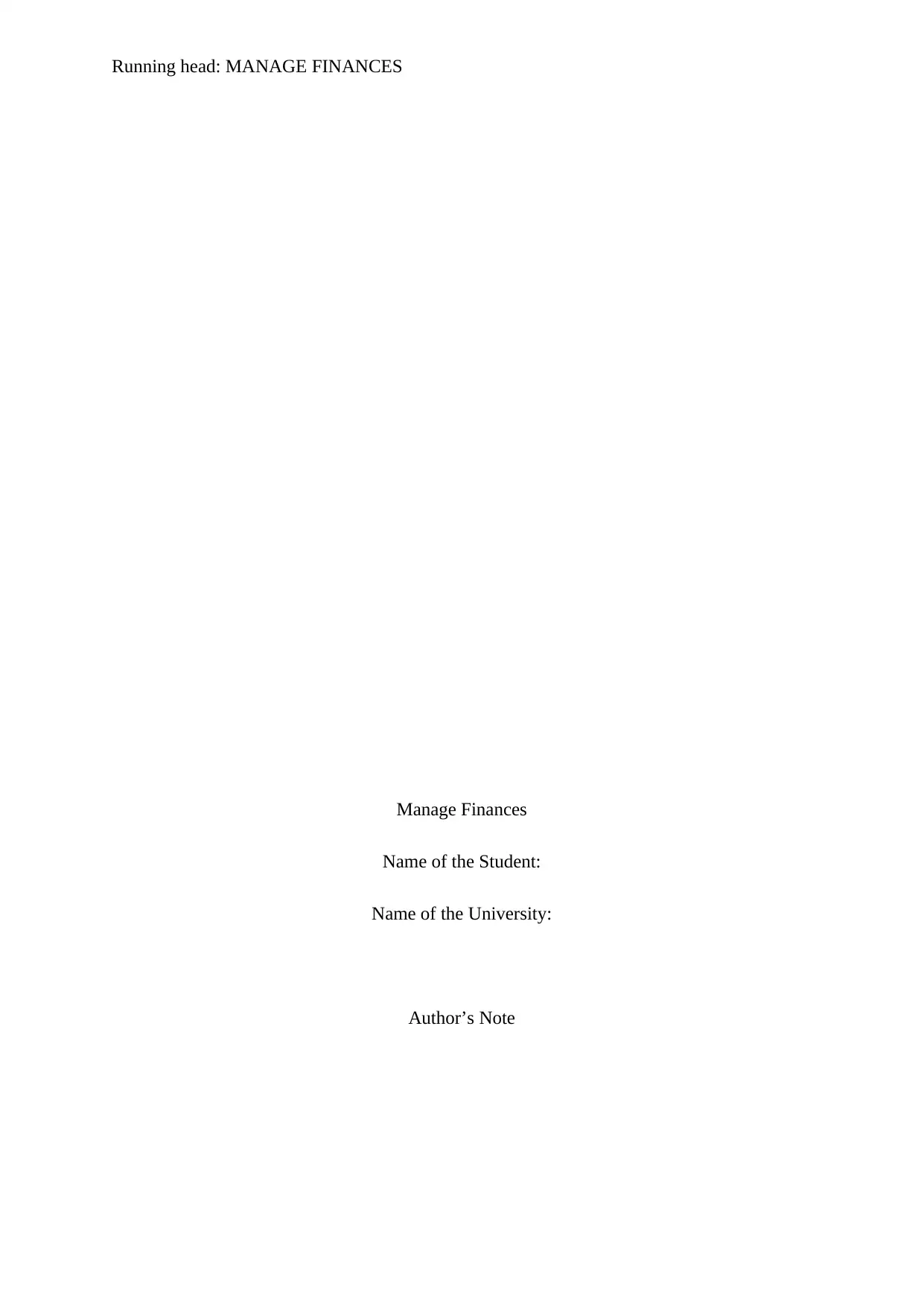
Running head: MANAGE FINANCES
Manage Finances
Name of the Student:
Name of the University:
Author’s Note
Manage Finances
Name of the Student:
Name of the University:
Author’s Note
Paraphrase This Document
Need a fresh take? Get an instant paraphrase of this document with our AI Paraphraser
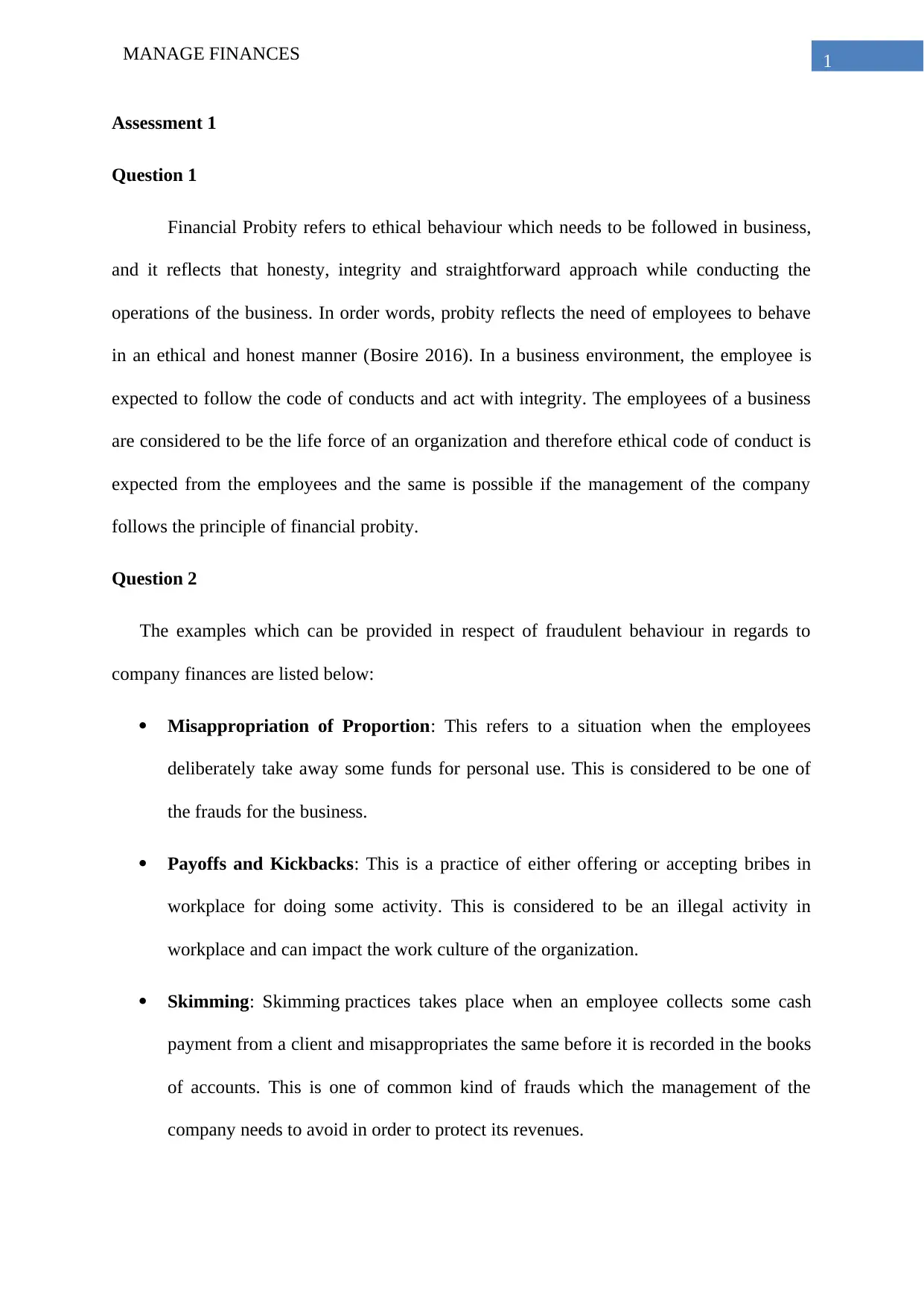
1MANAGE FINANCES
Assessment 1
Question 1
Financial Probity refers to ethical behaviour which needs to be followed in business,
and it reflects that honesty, integrity and straightforward approach while conducting the
operations of the business. In order words, probity reflects the need of employees to behave
in an ethical and honest manner (Bosire 2016). In a business environment, the employee is
expected to follow the code of conducts and act with integrity. The employees of a business
are considered to be the life force of an organization and therefore ethical code of conduct is
expected from the employees and the same is possible if the management of the company
follows the principle of financial probity.
Question 2
The examples which can be provided in respect of fraudulent behaviour in regards to
company finances are listed below:
Misappropriation of Proportion: This refers to a situation when the employees
deliberately take away some funds for personal use. This is considered to be one of
the frauds for the business.
Payoffs and Kickbacks: This is a practice of either offering or accepting bribes in
workplace for doing some activity. This is considered to be an illegal activity in
workplace and can impact the work culture of the organization.
Skimming: Skimming practices takes place when an employee collects some cash
payment from a client and misappropriates the same before it is recorded in the books
of accounts. This is one of common kind of frauds which the management of the
company needs to avoid in order to protect its revenues.
Assessment 1
Question 1
Financial Probity refers to ethical behaviour which needs to be followed in business,
and it reflects that honesty, integrity and straightforward approach while conducting the
operations of the business. In order words, probity reflects the need of employees to behave
in an ethical and honest manner (Bosire 2016). In a business environment, the employee is
expected to follow the code of conducts and act with integrity. The employees of a business
are considered to be the life force of an organization and therefore ethical code of conduct is
expected from the employees and the same is possible if the management of the company
follows the principle of financial probity.
Question 2
The examples which can be provided in respect of fraudulent behaviour in regards to
company finances are listed below:
Misappropriation of Proportion: This refers to a situation when the employees
deliberately take away some funds for personal use. This is considered to be one of
the frauds for the business.
Payoffs and Kickbacks: This is a practice of either offering or accepting bribes in
workplace for doing some activity. This is considered to be an illegal activity in
workplace and can impact the work culture of the organization.
Skimming: Skimming practices takes place when an employee collects some cash
payment from a client and misappropriates the same before it is recorded in the books
of accounts. This is one of common kind of frauds which the management of the
company needs to avoid in order to protect its revenues.
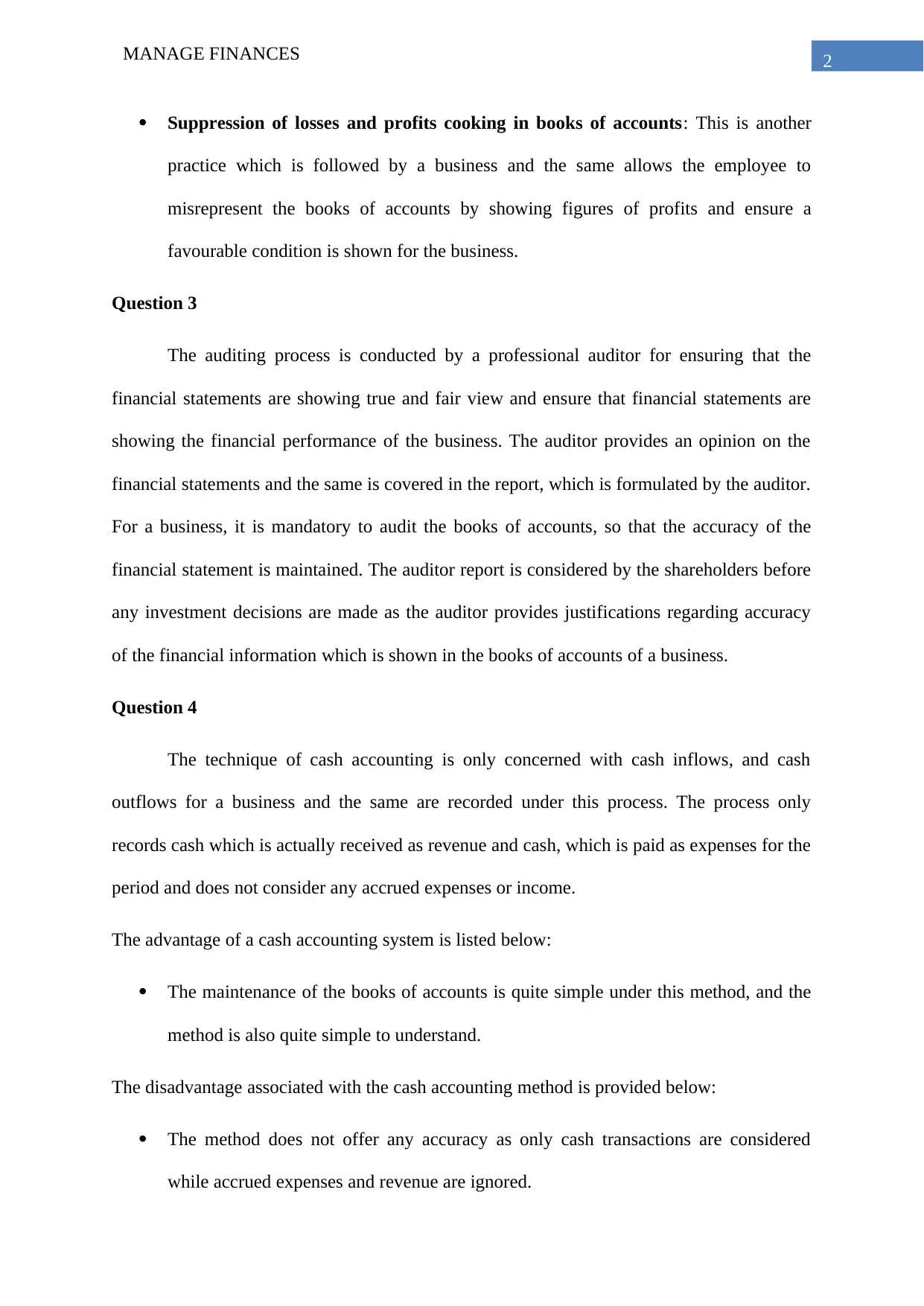
2MANAGE FINANCES
Suppression of losses and profits cooking in books of accounts: This is another
practice which is followed by a business and the same allows the employee to
misrepresent the books of accounts by showing figures of profits and ensure a
favourable condition is shown for the business.
Question 3
The auditing process is conducted by a professional auditor for ensuring that the
financial statements are showing true and fair view and ensure that financial statements are
showing the financial performance of the business. The auditor provides an opinion on the
financial statements and the same is covered in the report, which is formulated by the auditor.
For a business, it is mandatory to audit the books of accounts, so that the accuracy of the
financial statement is maintained. The auditor report is considered by the shareholders before
any investment decisions are made as the auditor provides justifications regarding accuracy
of the financial information which is shown in the books of accounts of a business.
Question 4
The technique of cash accounting is only concerned with cash inflows, and cash
outflows for a business and the same are recorded under this process. The process only
records cash which is actually received as revenue and cash, which is paid as expenses for the
period and does not consider any accrued expenses or income.
The advantage of a cash accounting system is listed below:
The maintenance of the books of accounts is quite simple under this method, and the
method is also quite simple to understand.
The disadvantage associated with the cash accounting method is provided below:
The method does not offer any accuracy as only cash transactions are considered
while accrued expenses and revenue are ignored.
Suppression of losses and profits cooking in books of accounts: This is another
practice which is followed by a business and the same allows the employee to
misrepresent the books of accounts by showing figures of profits and ensure a
favourable condition is shown for the business.
Question 3
The auditing process is conducted by a professional auditor for ensuring that the
financial statements are showing true and fair view and ensure that financial statements are
showing the financial performance of the business. The auditor provides an opinion on the
financial statements and the same is covered in the report, which is formulated by the auditor.
For a business, it is mandatory to audit the books of accounts, so that the accuracy of the
financial statement is maintained. The auditor report is considered by the shareholders before
any investment decisions are made as the auditor provides justifications regarding accuracy
of the financial information which is shown in the books of accounts of a business.
Question 4
The technique of cash accounting is only concerned with cash inflows, and cash
outflows for a business and the same are recorded under this process. The process only
records cash which is actually received as revenue and cash, which is paid as expenses for the
period and does not consider any accrued expenses or income.
The advantage of a cash accounting system is listed below:
The maintenance of the books of accounts is quite simple under this method, and the
method is also quite simple to understand.
The disadvantage associated with the cash accounting method is provided below:
The method does not offer any accuracy as only cash transactions are considered
while accrued expenses and revenue are ignored.
⊘ This is a preview!⊘
Do you want full access?
Subscribe today to unlock all pages.

Trusted by 1+ million students worldwide
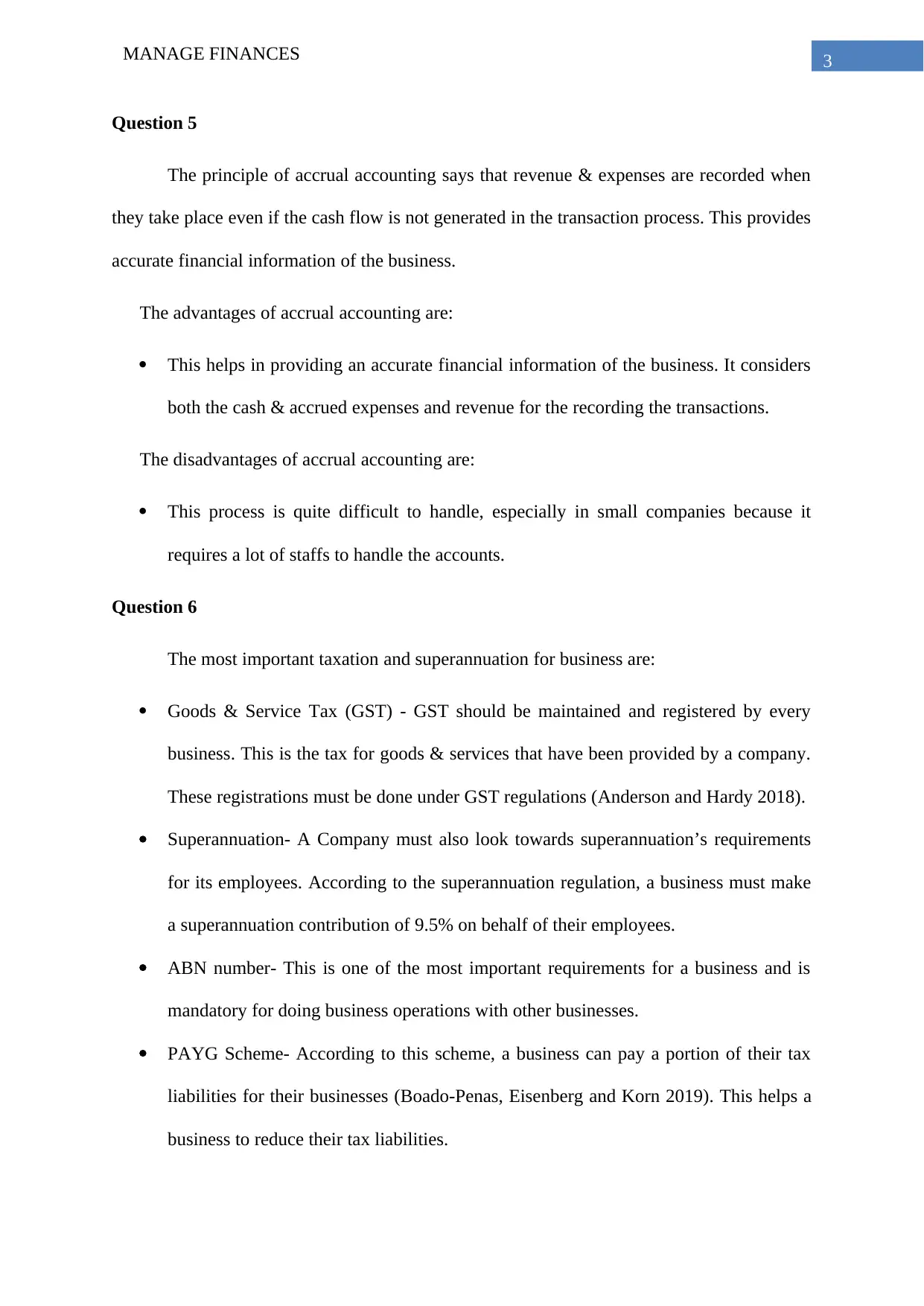
3MANAGE FINANCES
Question 5
The principle of accrual accounting says that revenue & expenses are recorded when
they take place even if the cash flow is not generated in the transaction process. This provides
accurate financial information of the business.
The advantages of accrual accounting are:
This helps in providing an accurate financial information of the business. It considers
both the cash & accrued expenses and revenue for the recording the transactions.
The disadvantages of accrual accounting are:
This process is quite difficult to handle, especially in small companies because it
requires a lot of staffs to handle the accounts.
Question 6
The most important taxation and superannuation for business are:
Goods & Service Tax (GST) - GST should be maintained and registered by every
business. This is the tax for goods & services that have been provided by a company.
These registrations must be done under GST regulations (Anderson and Hardy 2018).
Superannuation- A Company must also look towards superannuation’s requirements
for its employees. According to the superannuation regulation, a business must make
a superannuation contribution of 9.5% on behalf of their employees.
ABN number- This is one of the most important requirements for a business and is
mandatory for doing business operations with other businesses.
PAYG Scheme- According to this scheme, a business can pay a portion of their tax
liabilities for their businesses (Boado-Penas, Eisenberg and Korn 2019). This helps a
business to reduce their tax liabilities.
Question 5
The principle of accrual accounting says that revenue & expenses are recorded when
they take place even if the cash flow is not generated in the transaction process. This provides
accurate financial information of the business.
The advantages of accrual accounting are:
This helps in providing an accurate financial information of the business. It considers
both the cash & accrued expenses and revenue for the recording the transactions.
The disadvantages of accrual accounting are:
This process is quite difficult to handle, especially in small companies because it
requires a lot of staffs to handle the accounts.
Question 6
The most important taxation and superannuation for business are:
Goods & Service Tax (GST) - GST should be maintained and registered by every
business. This is the tax for goods & services that have been provided by a company.
These registrations must be done under GST regulations (Anderson and Hardy 2018).
Superannuation- A Company must also look towards superannuation’s requirements
for its employees. According to the superannuation regulation, a business must make
a superannuation contribution of 9.5% on behalf of their employees.
ABN number- This is one of the most important requirements for a business and is
mandatory for doing business operations with other businesses.
PAYG Scheme- According to this scheme, a business can pay a portion of their tax
liabilities for their businesses (Boado-Penas, Eisenberg and Korn 2019). This helps a
business to reduce their tax liabilities.
Paraphrase This Document
Need a fresh take? Get an instant paraphrase of this document with our AI Paraphraser
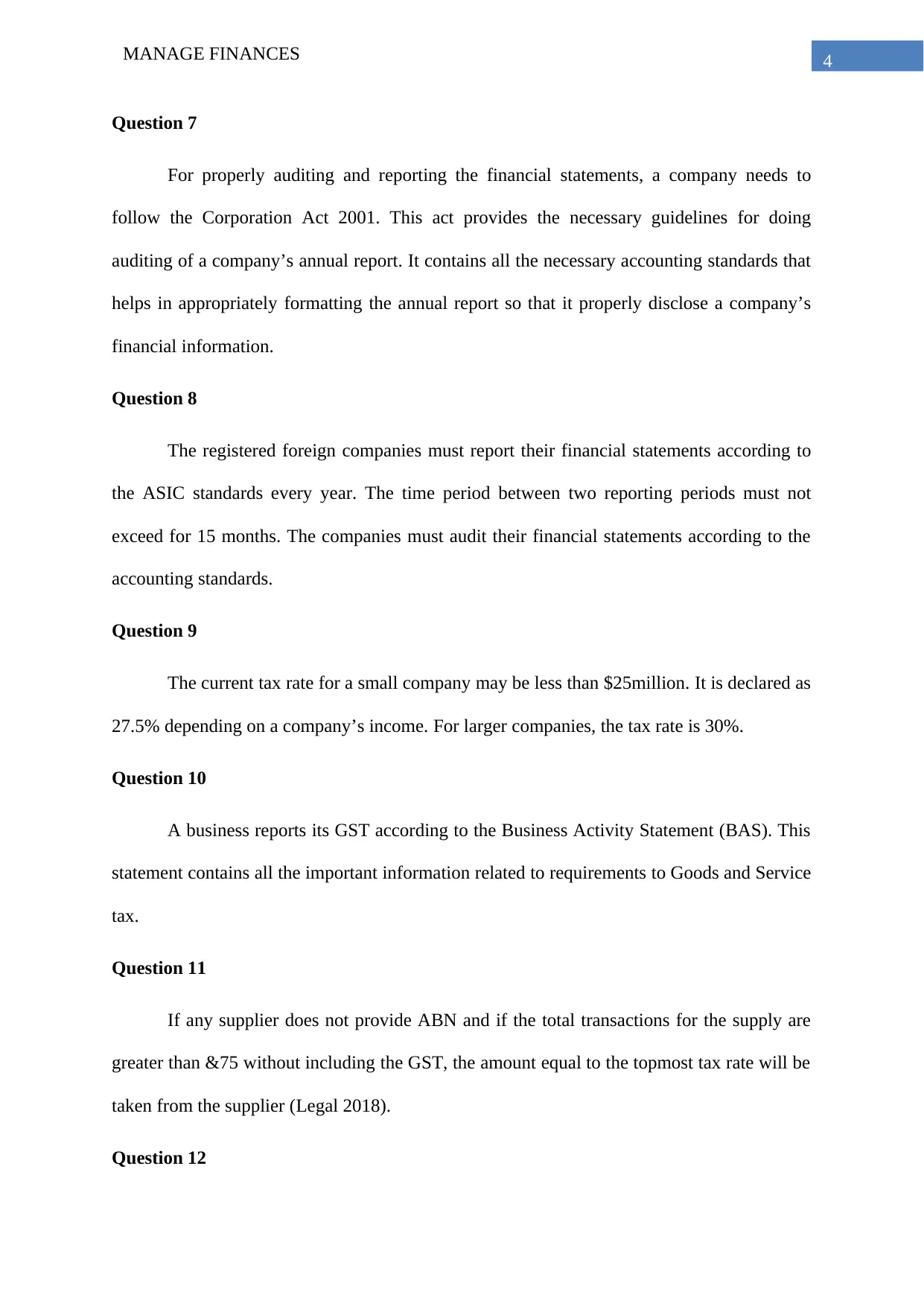
4MANAGE FINANCES
Question 7
For properly auditing and reporting the financial statements, a company needs to
follow the Corporation Act 2001. This act provides the necessary guidelines for doing
auditing of a company’s annual report. It contains all the necessary accounting standards that
helps in appropriately formatting the annual report so that it properly disclose a company’s
financial information.
Question 8
The registered foreign companies must report their financial statements according to
the ASIC standards every year. The time period between two reporting periods must not
exceed for 15 months. The companies must audit their financial statements according to the
accounting standards.
Question 9
The current tax rate for a small company may be less than $25million. It is declared as
27.5% depending on a company’s income. For larger companies, the tax rate is 30%.
Question 10
A business reports its GST according to the Business Activity Statement (BAS). This
statement contains all the important information related to requirements to Goods and Service
tax.
Question 11
If any supplier does not provide ABN and if the total transactions for the supply are
greater than &75 without including the GST, the amount equal to the topmost tax rate will be
taken from the supplier (Legal 2018).
Question 12
Question 7
For properly auditing and reporting the financial statements, a company needs to
follow the Corporation Act 2001. This act provides the necessary guidelines for doing
auditing of a company’s annual report. It contains all the necessary accounting standards that
helps in appropriately formatting the annual report so that it properly disclose a company’s
financial information.
Question 8
The registered foreign companies must report their financial statements according to
the ASIC standards every year. The time period between two reporting periods must not
exceed for 15 months. The companies must audit their financial statements according to the
accounting standards.
Question 9
The current tax rate for a small company may be less than $25million. It is declared as
27.5% depending on a company’s income. For larger companies, the tax rate is 30%.
Question 10
A business reports its GST according to the Business Activity Statement (BAS). This
statement contains all the important information related to requirements to Goods and Service
tax.
Question 11
If any supplier does not provide ABN and if the total transactions for the supply are
greater than &75 without including the GST, the amount equal to the topmost tax rate will be
taken from the supplier (Legal 2018).
Question 12
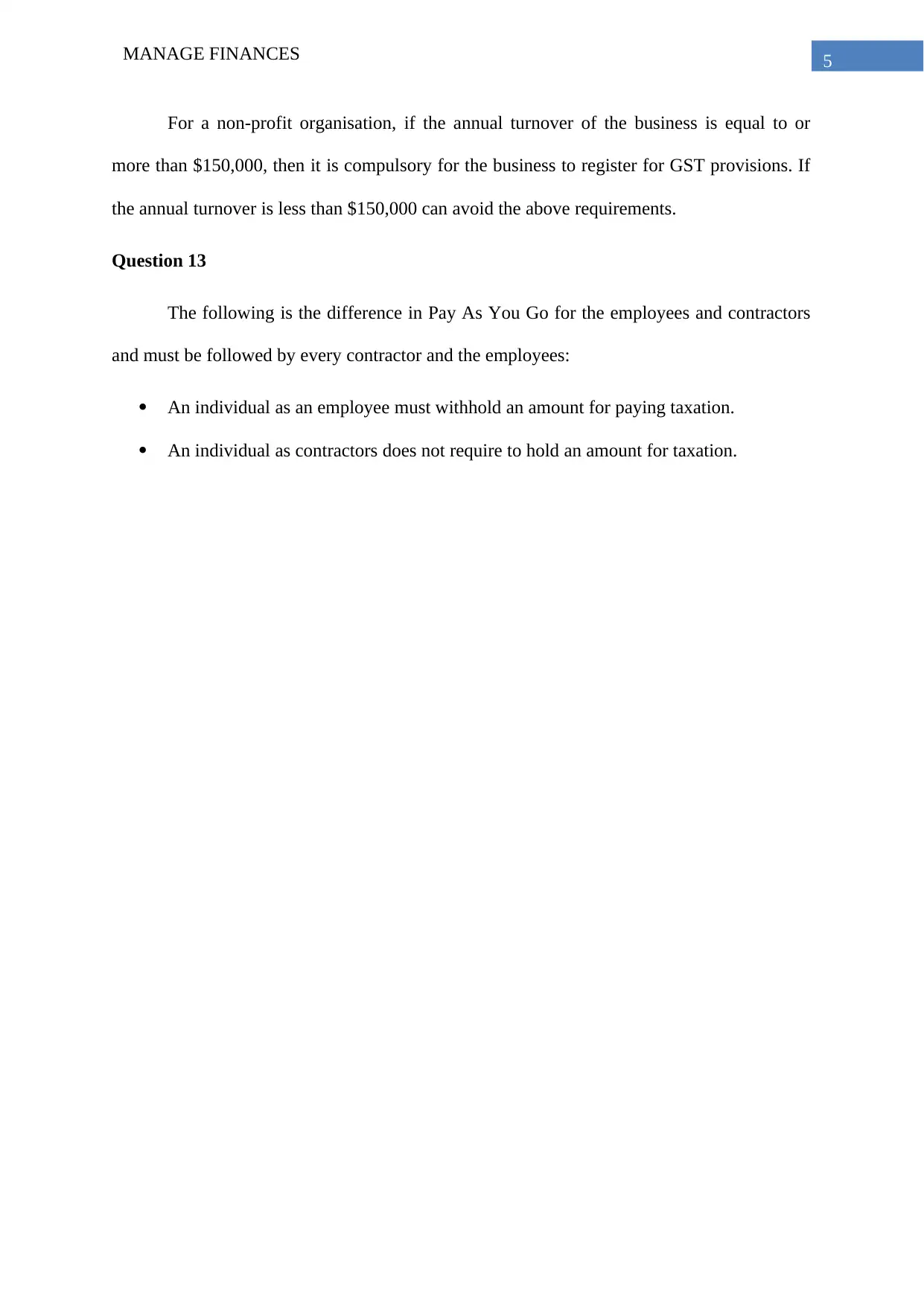
5MANAGE FINANCES
For a non-profit organisation, if the annual turnover of the business is equal to or
more than $150,000, then it is compulsory for the business to register for GST provisions. If
the annual turnover is less than $150,000 can avoid the above requirements.
Question 13
The following is the difference in Pay As You Go for the employees and contractors
and must be followed by every contractor and the employees:
An individual as an employee must withhold an amount for paying taxation.
An individual as contractors does not require to hold an amount for taxation.
For a non-profit organisation, if the annual turnover of the business is equal to or
more than $150,000, then it is compulsory for the business to register for GST provisions. If
the annual turnover is less than $150,000 can avoid the above requirements.
Question 13
The following is the difference in Pay As You Go for the employees and contractors
and must be followed by every contractor and the employees:
An individual as an employee must withhold an amount for paying taxation.
An individual as contractors does not require to hold an amount for taxation.
⊘ This is a preview!⊘
Do you want full access?
Subscribe today to unlock all pages.

Trusted by 1+ million students worldwide
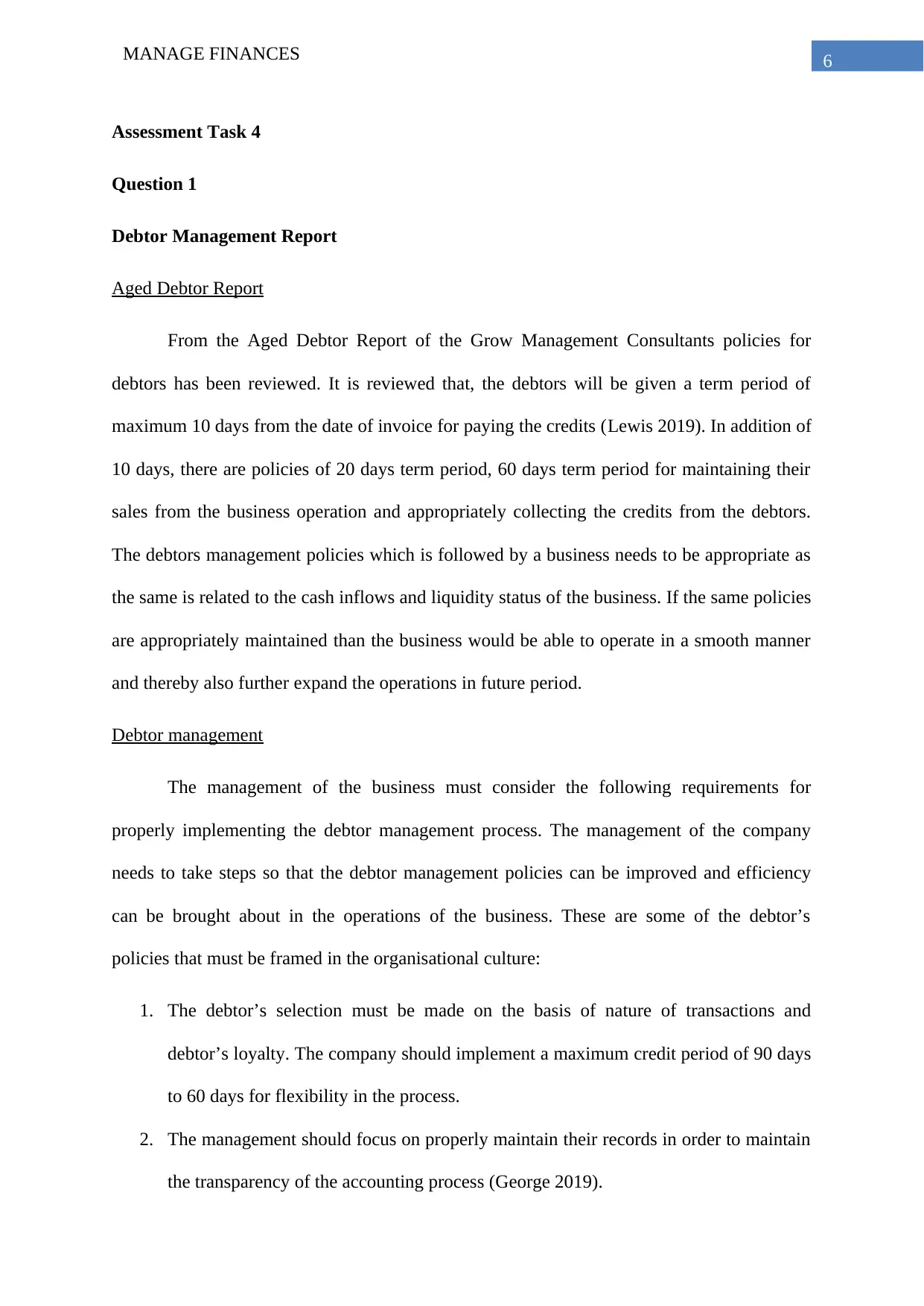
6MANAGE FINANCES
Assessment Task 4
Question 1
Debtor Management Report
Aged Debtor Report
From the Aged Debtor Report of the Grow Management Consultants policies for
debtors has been reviewed. It is reviewed that, the debtors will be given a term period of
maximum 10 days from the date of invoice for paying the credits (Lewis 2019). In addition of
10 days, there are policies of 20 days term period, 60 days term period for maintaining their
sales from the business operation and appropriately collecting the credits from the debtors.
The debtors management policies which is followed by a business needs to be appropriate as
the same is related to the cash inflows and liquidity status of the business. If the same policies
are appropriately maintained than the business would be able to operate in a smooth manner
and thereby also further expand the operations in future period.
Debtor management
The management of the business must consider the following requirements for
properly implementing the debtor management process. The management of the company
needs to take steps so that the debtor management policies can be improved and efficiency
can be brought about in the operations of the business. These are some of the debtor’s
policies that must be framed in the organisational culture:
1. The debtor’s selection must be made on the basis of nature of transactions and
debtor’s loyalty. The company should implement a maximum credit period of 90 days
to 60 days for flexibility in the process.
2. The management should focus on properly maintain their records in order to maintain
the transparency of the accounting process (George 2019).
Assessment Task 4
Question 1
Debtor Management Report
Aged Debtor Report
From the Aged Debtor Report of the Grow Management Consultants policies for
debtors has been reviewed. It is reviewed that, the debtors will be given a term period of
maximum 10 days from the date of invoice for paying the credits (Lewis 2019). In addition of
10 days, there are policies of 20 days term period, 60 days term period for maintaining their
sales from the business operation and appropriately collecting the credits from the debtors.
The debtors management policies which is followed by a business needs to be appropriate as
the same is related to the cash inflows and liquidity status of the business. If the same policies
are appropriately maintained than the business would be able to operate in a smooth manner
and thereby also further expand the operations in future period.
Debtor management
The management of the business must consider the following requirements for
properly implementing the debtor management process. The management of the company
needs to take steps so that the debtor management policies can be improved and efficiency
can be brought about in the operations of the business. These are some of the debtor’s
policies that must be framed in the organisational culture:
1. The debtor’s selection must be made on the basis of nature of transactions and
debtor’s loyalty. The company should implement a maximum credit period of 90 days
to 60 days for flexibility in the process.
2. The management should focus on properly maintain their records in order to maintain
the transparency of the accounting process (George 2019).
Paraphrase This Document
Need a fresh take? Get an instant paraphrase of this document with our AI Paraphraser
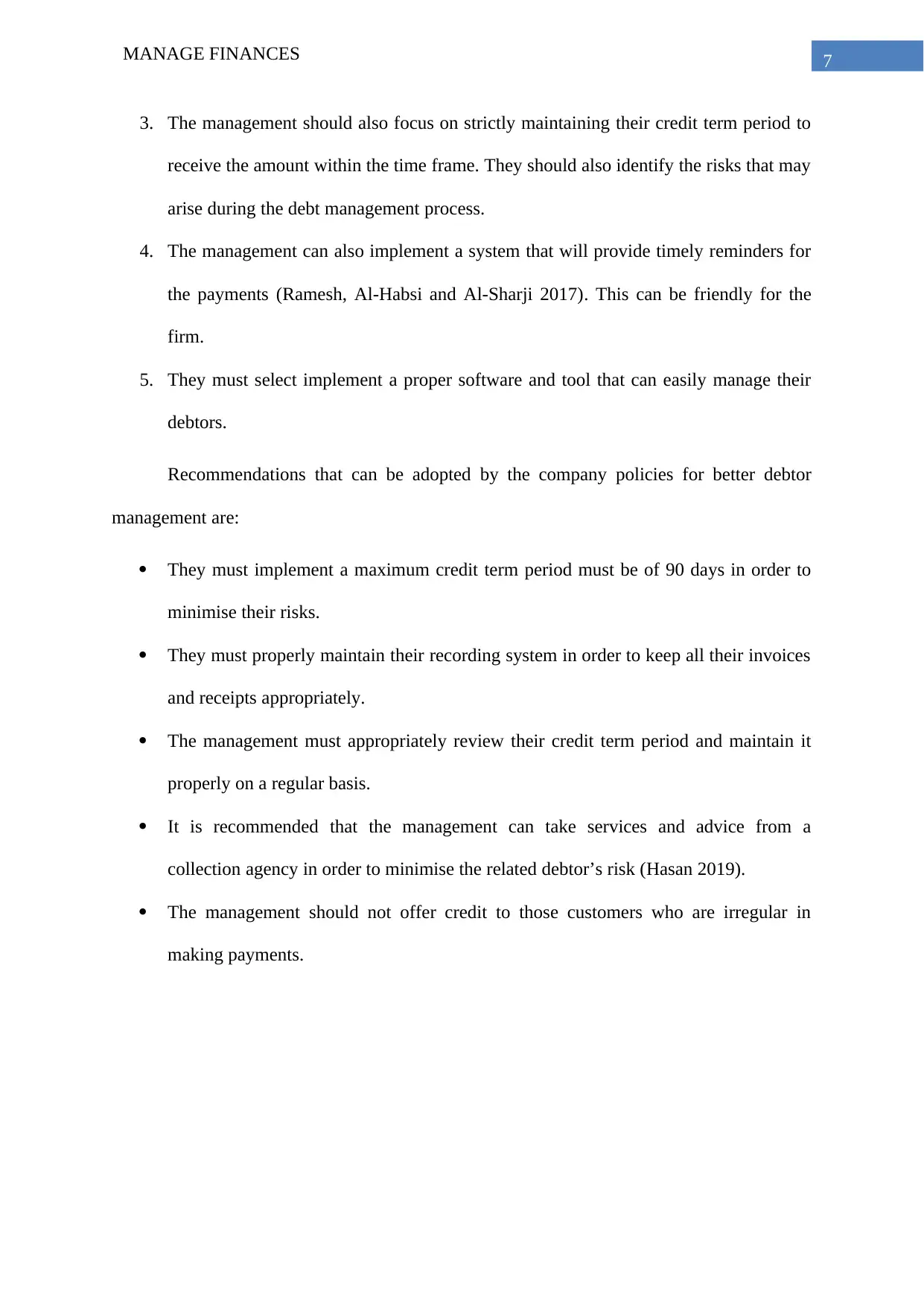
7MANAGE FINANCES
3. The management should also focus on strictly maintaining their credit term period to
receive the amount within the time frame. They should also identify the risks that may
arise during the debt management process.
4. The management can also implement a system that will provide timely reminders for
the payments (Ramesh, Al-Habsi and Al-Sharji 2017). This can be friendly for the
firm.
5. They must select implement a proper software and tool that can easily manage their
debtors.
Recommendations that can be adopted by the company policies for better debtor
management are:
They must implement a maximum credit term period must be of 90 days in order to
minimise their risks.
They must properly maintain their recording system in order to keep all their invoices
and receipts appropriately.
The management must appropriately review their credit term period and maintain it
properly on a regular basis.
It is recommended that the management can take services and advice from a
collection agency in order to minimise the related debtor’s risk (Hasan 2019).
The management should not offer credit to those customers who are irregular in
making payments.
3. The management should also focus on strictly maintaining their credit term period to
receive the amount within the time frame. They should also identify the risks that may
arise during the debt management process.
4. The management can also implement a system that will provide timely reminders for
the payments (Ramesh, Al-Habsi and Al-Sharji 2017). This can be friendly for the
firm.
5. They must select implement a proper software and tool that can easily manage their
debtors.
Recommendations that can be adopted by the company policies for better debtor
management are:
They must implement a maximum credit term period must be of 90 days in order to
minimise their risks.
They must properly maintain their recording system in order to keep all their invoices
and receipts appropriately.
The management must appropriately review their credit term period and maintain it
properly on a regular basis.
It is recommended that the management can take services and advice from a
collection agency in order to minimise the related debtor’s risk (Hasan 2019).
The management should not offer credit to those customers who are irregular in
making payments.
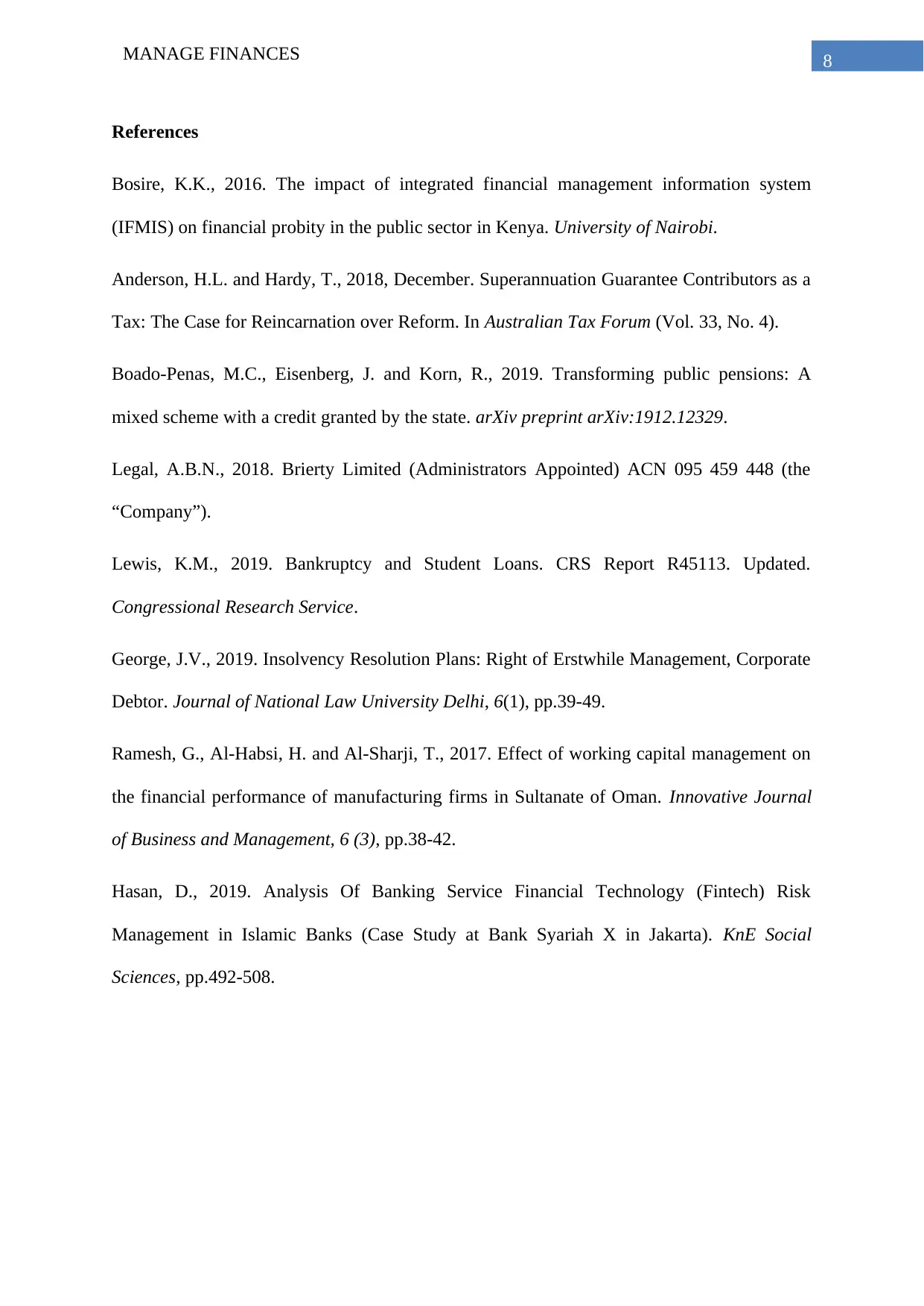
8MANAGE FINANCES
References
Bosire, K.K., 2016. The impact of integrated financial management information system
(IFMIS) on financial probity in the public sector in Kenya. University of Nairobi.
Anderson, H.L. and Hardy, T., 2018, December. Superannuation Guarantee Contributors as a
Tax: The Case for Reincarnation over Reform. In Australian Tax Forum (Vol. 33, No. 4).
Boado-Penas, M.C., Eisenberg, J. and Korn, R., 2019. Transforming public pensions: A
mixed scheme with a credit granted by the state. arXiv preprint arXiv:1912.12329.
Legal, A.B.N., 2018. Brierty Limited (Administrators Appointed) ACN 095 459 448 (the
“Company”).
Lewis, K.M., 2019. Bankruptcy and Student Loans. CRS Report R45113. Updated.
Congressional Research Service.
George, J.V., 2019. Insolvency Resolution Plans: Right of Erstwhile Management, Corporate
Debtor. Journal of National Law University Delhi, 6(1), pp.39-49.
Ramesh, G., Al-Habsi, H. and Al-Sharji, T., 2017. Effect of working capital management on
the financial performance of manufacturing firms in Sultanate of Oman. Innovative Journal
of Business and Management, 6 (3), pp.38-42.
Hasan, D., 2019. Analysis Of Banking Service Financial Technology (Fintech) Risk
Management in Islamic Banks (Case Study at Bank Syariah X in Jakarta). KnE Social
Sciences, pp.492-508.
References
Bosire, K.K., 2016. The impact of integrated financial management information system
(IFMIS) on financial probity in the public sector in Kenya. University of Nairobi.
Anderson, H.L. and Hardy, T., 2018, December. Superannuation Guarantee Contributors as a
Tax: The Case for Reincarnation over Reform. In Australian Tax Forum (Vol. 33, No. 4).
Boado-Penas, M.C., Eisenberg, J. and Korn, R., 2019. Transforming public pensions: A
mixed scheme with a credit granted by the state. arXiv preprint arXiv:1912.12329.
Legal, A.B.N., 2018. Brierty Limited (Administrators Appointed) ACN 095 459 448 (the
“Company”).
Lewis, K.M., 2019. Bankruptcy and Student Loans. CRS Report R45113. Updated.
Congressional Research Service.
George, J.V., 2019. Insolvency Resolution Plans: Right of Erstwhile Management, Corporate
Debtor. Journal of National Law University Delhi, 6(1), pp.39-49.
Ramesh, G., Al-Habsi, H. and Al-Sharji, T., 2017. Effect of working capital management on
the financial performance of manufacturing firms in Sultanate of Oman. Innovative Journal
of Business and Management, 6 (3), pp.38-42.
Hasan, D., 2019. Analysis Of Banking Service Financial Technology (Fintech) Risk
Management in Islamic Banks (Case Study at Bank Syariah X in Jakarta). KnE Social
Sciences, pp.492-508.
⊘ This is a preview!⊘
Do you want full access?
Subscribe today to unlock all pages.

Trusted by 1+ million students worldwide
1 out of 9
Related Documents
Your All-in-One AI-Powered Toolkit for Academic Success.
+13062052269
info@desklib.com
Available 24*7 on WhatsApp / Email
![[object Object]](/_next/static/media/star-bottom.7253800d.svg)
Unlock your academic potential
Copyright © 2020–2025 A2Z Services. All Rights Reserved. Developed and managed by ZUCOL.




